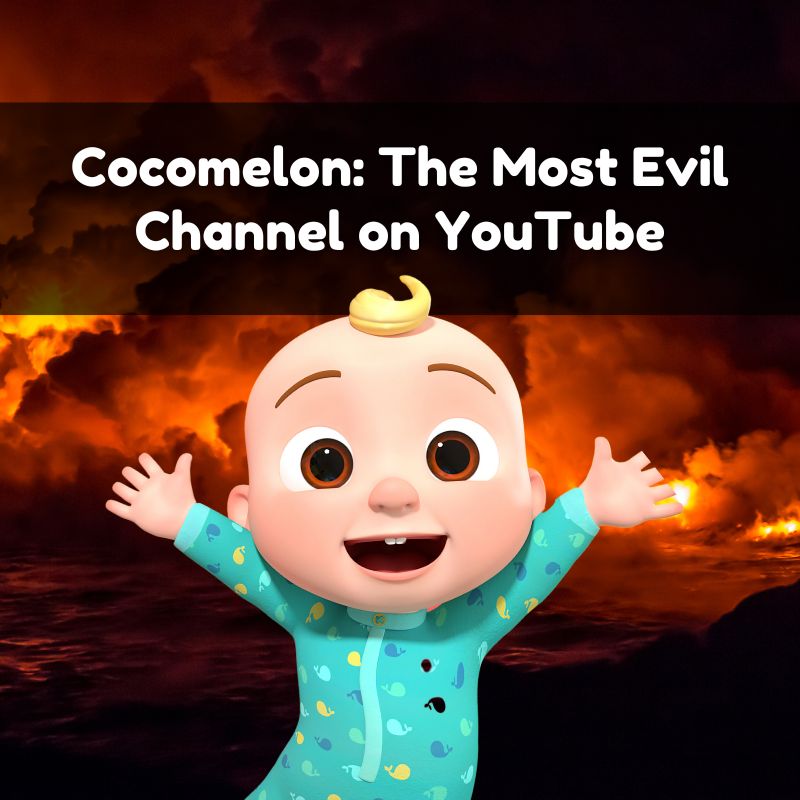
Report on “Cocomelon: The Most Evil Channel on YouTube” as Described by SunnyV2
Introduction: Cocomelon, a massively popular YouTube channel for toddlers, is often regarded as a harmless, educational source of entertainment for young children. However, in a video by the YouTuber SunnyV2, the channel is criticized for being detrimental to child development and for prioritizing profit over the well-being of its audience. The video sparked widespread discussion online, with many users expressing concern over the content and parenting styles enabled by Cocomelon.
The Dark Side of Cocomelon: SunnyV2’s central argument is that Cocomelon, under the guise of child-friendly content, is exploiting children and causing harmful developmental effects. While it presents itself as an educational platform, SunnyV2 asserts that its primary focus is to captivate children and generate revenue, often at the expense of their mental health. The rapid, hyper-stimulating visuals and repetitive music have been called into question for potentially causing attention disorders and other behavioral issues in young children.
This sentiment is echoed by many comments, such as those from @arnobasson9532, who as an educational psychologist, highlighted the untold damage caused to children’s language development, attention spans, and working memory. Similarly, @NikkieN1992 mentioned her efforts to block Cocomelon from her household in favor of older cartoons that she believes provide better learning opportunities.
Impact on Parenting: One of the core points made by SunnyV2 and supported by numerous commenters is that Cocomelon is not just harmful on its own, but it also facilitates bad parenting. Many parents rely on Cocomelon as a digital babysitter, allowing their children to consume excessive screen time while they attend to other tasks. @justarandomguy6794 emphasizes that parents, rather than Cocomelon, should be held accountable for using the platform as a substitute for active parenting.
Other commenters, such as @df4196, made the argument that parents who complain about the effects of Cocomelon are deflecting responsibility from themselves, implying that their over-reliance on technology is the true root of the issue.
Brainrot and Addiction Comparisons: A significant number of commenters have described the effect of Cocomelon as “brainrot” – a term indicating that the content has a degenerative effect on children’s cognitive development. @sdx3918 and @Basschannel1, both professionals working in child psychology, highlight how children become conditioned to crave constant stimulation, and how these behavioral patterns have long-term implications, particularly in terms of social and cognitive development.
In addition to “brainrot,” there are comparisons to addiction, with @animebunny406 making a humorous yet telling remark that “COCO” is slang for cocaine, suggesting children become hooked on the content much like a drug.
Comparison to Older Shows: Many viewers reflect nostalgically on older children’s shows, contrasting them with Cocomelon. @Iron.Historian and @GhostUnderTheLight-bi1ek mention classic shows like Tom & Jerry and Cartoon Network from the 2000s, highlighting how those cartoons, despite being chaotic, still had elements of humor and storytelling that weren’t as overstimulating as Cocomelon. @kirkginoabolafia3650 laments that Cocomelon is devoid of any meaningful educational content, unlike older shows like Cyberchase, Zaboomafoo, or Mister Rogers’ Neighborhood, which were not only entertaining but also taught valuable life skills.
Addressing the ADHD Controversy: A common claim in the debate surrounding Cocomelon is its potential to cause ADHD in children. @Zanzuz, diagnosed with ADHD, refutes the notion that Cocomelon is responsible for causing the condition, instead asserting that ADHD is a hereditary disorder. However, they acknowledge that overstimulating content like Cocomelon can exacerbate ADHD-like symptoms in children, leading to difficulty in focusing and regulating behavior.
Conclusion: The commentary on SunnyV2’s video has opened up an important conversation about the effects of digital media on young children and the role of parenting in managing screen time. While Cocomelon may not inherently be “evil,” its design, focused on maximizing engagement and profits, has potentially harmful effects on young minds. Moreover, the debate emphasizes the responsibility of parents to limit screen time and choose content that genuinely contributes to a child’s intellectual and emotional development. SunnyV2’s critique encourages a deeper investigation into the consequences of modern children’s media and the technology-fueled parenting practices that enable it.
Ultimately, the uproar against Cocomelon suggests that it is not just the content itself that poses problems but the larger societal shift towards passive, tech-driven parenting that needs to be addressed.
